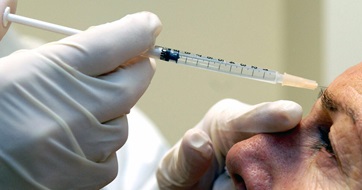OUT-LAW NEWS 4 min. read
England and Scotland crack down on ‘rogue’ non-surgical cosmetic procedures

Bob Riha Jr/Getty Images
07 Aug 2025, 2:41 pm
New proposals to further regulate and licence non-surgical cosmetic procedures (NSCPs) in England and Scotland are welcome, but the governments must act quickly to ensure this “wild west” system has better safeguards, an expert says.
Louise Fullwood of Pinsent Masons was commenting following the UK government’s announcement that it will introduce tough new measures to regulate aesthetic procedures such as ‘Brazilian butt lifts’, Botox and fillers after numerous incidences of botched treatments have left people maimed, injured and requiring hospital treatment.
The UK’s Chartered Trading Standards Institute has previously called for “urgent regulation” in this area, saying too many unregulated aesthetic procedures are being performed by “a wild west of untrained, unlicensed and uninsured individuals who may be putting lives in danger.”
The UK government says it plans to introduce regulations to restrict the highest risk procedures first – such as fillers injected into breasts and genitals – in England. A public consultation will be published early next year, which will seek views on the range of procedures which should be covered in the new restrictions. England already held a consultation on whether to tighten regulation and introduce a new licensing regime for NSCPs in 2023, but no legislation has been put forward to date.
Fullwood, a medical law expert at Pinsent Masons, said regulation in this area is sorely needed. “Given the litany of horror stories from botched procedures which have caused physical and emotional harm to customers, and even deaths, there is a clear need to speed up getting this ‘wild west’ system better regulated,” she said.
Fullwood said the gap in regulation was all the more stark compared with the strict regulatory regimes already in place for other types of healthcare services providers. In England, for example, the regulatory responsibilities of the Care Quality Commission (CQC), as well as overseeing hospitals, GPs, dentists, ambulances and mental health services, also extend to care practitioners that perform personal hygiene duties, such as nurses that provide earwax removal services. “These practitioners are required to be registered and meet fixed care standards, and are inspected and rated regularly, with serious sanctions for non-compliance,” said Fullwood, “but an untrained person can inject half a litre of filler into someone for a butt lift pretty much totally unregulated.”
Under the current proposals, healthcare professionals in England carrying out the highest risk procedures, which include Brazilian butt lifts, will be required to work in services that are registered with, inspected and regulated by the CQQ.
The UK government’s announcement comes exactly six weeks after the Scottish government unveiled its own plans to further regulate NSCPs in a move designed to remove untrained practitioners from the market and improve patient safety and industry standards.
The proposals were outlined following an eight-week public consultation that took place between 20 December 2024 and 14 February 2025 to determine how the Scottish government should improve regulation after warnings that the industry had become dominated by “rogue traders”.
The Scottish government is targeting introducing the bill by the end of year. If passed in the expected timeframe, it seems likely that it will be the first of its kind in the UK. Wales introduced its own licensing regime for four special cosmetic procedures in November 2024, but this did not extend to beauty procedures like Botox or fillers.
In 2021, the Botulinum Toxin and Cosmetic Fillers (Children) Act was introduced in England, which made it a criminal offence to administer injectable toxins or fillers for a cosmetic purpose to anyone under the age of 18. The UK now says it also plans to restrict high-risk cosmetic procedures such as Brazilian butt lifts to over 18s in England “unless authorised by a healthcare professional”.
Currently neither Wales nor Scotland have an age requirement banning those under 18 from receiving NSCPs. The Scottish government says its proposed legislation will restrict NSCPs from being carried out on under 18s.
Scotland’s bill is also expected to require certain procedures to be delivered from suitable premises – either an independent clinic or healthcare setting regulated by Healthcare Improvement Scotland (HIS) or premises licensed by the local authority – and will make provision to support the enforcement of appropriate standards for service providers.
Fullwood said further regulation would have a broad impact on both customers and industry. “Regulation which removes untrained practitioners from the market and implements a licensing regime will likely increase prices for consumers,” she said. “The impact on demand will be interesting to witness, as will whether it will create a black market for those previously operating in the space that are unable to gain the necessary licences to continue their operations.”
Jaqueline Harris, a product liability and litigation expert at Pinsent Masons, said: “Both pharmaceutical companies and third-party suppliers or distributors of these products will need to be mindful of the regulation. It seems likely that it would increase scrutiny on supply chains. Any legal risks are uncertain until we have sight of the proposed legislation, but we can be fairly certain at this stage that it would, in any event, carry significant reputational risks for those involved in a supply chain that ends in unregulated use.”
Carrying out adequate buyer due diligence and using appropriate indemnity clauses in sales could help, but may not eradicate risk, added Harris.
The non-invasive treatment market is valued at over £11bn globally and is expected to continue growing. It is a valuable source of revenue for pharmaceutical companies manufacturing the products used. “Businesses should consider mitigations now to ensure they aren’t caught unprepared should this become law,” said Fullwood. “It will be important to keep an eye out for the bill’s introduction, which may give clarity on the risks. Regulatory developments elsewhere should also be monitored, especially as the market for such procedures continues its rapid expansion.”
As regulatory authorities consider how to respond to the government’s proposals, the Nursing and Midwifery Council has required all its registered members across the UK who are licensed to prescribe prescription treatments, including Botox and fillers, to carry out face-to-face consultations before offering such treatments. Remote prescriptions for these types of aesthetic procedures will no longer be permitted.
Calum Atterbury of Pinsent Masons said businesses affected by these changes must ensure they are also taking the necessary steps to improve patient safety and industry standards. “Any business using nurse practitioners for the prescribing of such prescriptions or treatments should review its policies and procedures to ensure that it is complying with these requirements,” he said.
The Scottish government says it also plans to pursue secondary legislation under the Civic Government (Scotland) Act 1982 to establish a licensing regime for less invasive (group 1) procedures such as microneedling; chemical peels that only affect the outermost level of skin; intense pulsed light (IPL/LED) therapy; the use of lasers for tattoo removal; and laser hair removal.
Latest News
Editor's Pick
OUT-LAW ANALYSIS
19 Sep 2023

